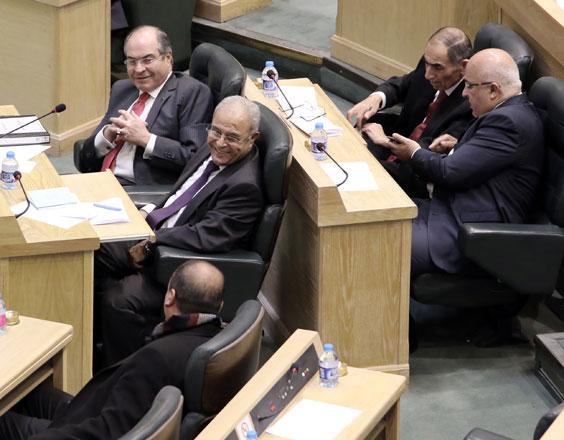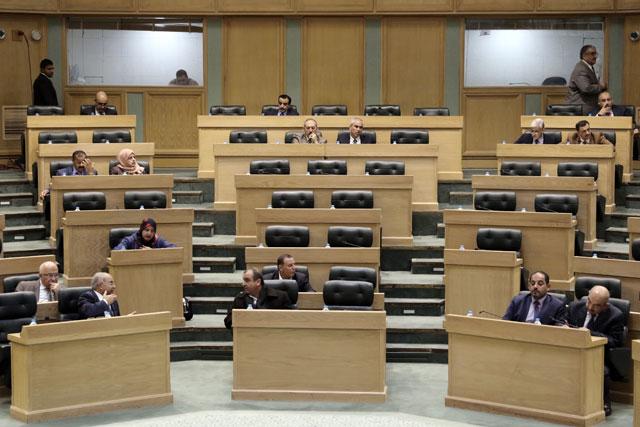You are here
Lower House begins budget debate
By Jassar Al Tahat - Jan 15,2017 - Last updated at Jan 15,2017

Prime Minister Hani Mulki and members of his Cabinet attend a Lower House session on Sunday (Photo by Osama Aqarbeh)
AMMAN — The Lower House on Sunday started debating the 2017 draft laws for the state budget and the budgets of independent government units.
During the session, some MPs criticised the "tax collecting" policies as unimaginative and traditional, while others debated and presented what they described as "more convenient" policies.
MP Khamis Atiyeh (Amman, 3rd District) described the budget as "traditional" and depending on taxes to narrow the deficit and secure money for the Treasury, "making the country a tax collector that reaches into people's pockets, which are already empty".
He said that the budget should restructure the national economy to bring back the "middle class" and protect the poor, by rejecting any new taxes, not increasing the sales tax.
For his part, Mafraq MP Mifleh Khazaaleh suggested that the government should not reimburse any allowances for ministers or senior officials, and instead cap state officials’ salaries at JD5,000 per month in order to minimise spending.
Khazaaleh also stressed the importance of increasing the minimum wage from JD190 to JD240 per month, supporting young farmers and livestock breeders, as well as supporting the military and security agencies.
MP Nidal Taani (Irbid, 1st District) called for conducting a serious review of the role of the International Monetary Fund (IMF) and the World Bank in influencing the country's economic policies.
Northern Badia Deputy Habes Shabeeb also blamed the IMF for "failed policies", and stressed the need to keep the military and security services well equipped and funded, especially at a time when Jordan is surrounded by conflict.
Deputy Khaled Awad (Amman, 3rd District) said Jordanians have been hearing the same speech from governments for the past two decades.
"Governments have always been telling us that we are living in hard times, yet the same measures are taken to address the same problems,” Awad said.
He highlighted the need to address the quality of medical services, increase the minimum wage and improve hiring policies to ensure a decent life for citizens.
Lawmaker Mohammad Qudah (Zarqa, 1st District) said the draft budget "attacks the poor while there are entities making millions and evading taxes".
He urged the approval of a zakat law, in line with the Islamic tax on income, as well as obliging banks to establish development and economic projects and provide jobs.
Qudah also criticised the government’s approach to tackling corruption and prosecuting those responsible.
MP Ibrahim Bani Hani (Irbid, 1st District) described 2017 as "the year of famine", advising the government to postpone or cancel any unnecessary new capital projects in the budget, since Jordan is going through a period of "severe economic turbulence".
Related Articles
AMMAN — The Lower House approved the draft environment protection law on Tuesday after an extended discussion during a legislative session,
AMMAN — The Lower House’s second session to debate the 2017 draft budget ended abruptly on Tuesday evening after an altercation between MPs.
AMMAN — The Lower House’s second session to debate the 2017 draft budget ended abruptly on Tuesday evening after an altercation betwee













